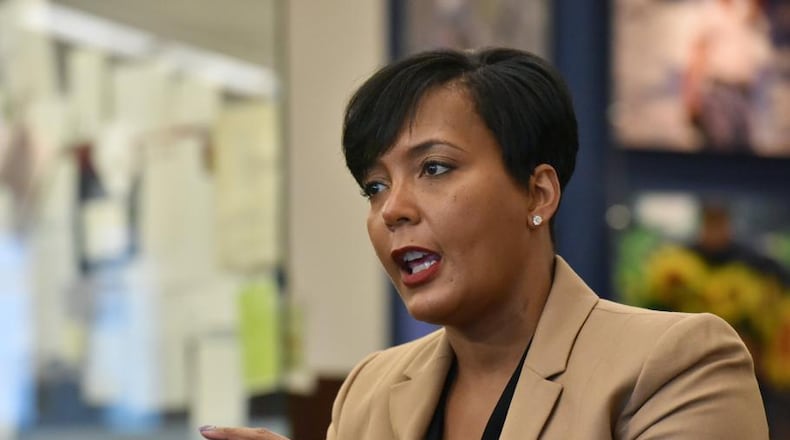After more than three years of a federal investigation looking into Atlanta City Hall corruption, Atlanta City Council and Mayor Keisha Lance Bottoms have implemented a number of new ordinances aimed at increasing city government transparency or reducing abuses of the public trust. Here are five key transparency or anti-corruption efforts since Bottoms took office in January 2018:
Open Checkbook
Atlanta Mayor Keisha Lance Bottoms placed the city's checkbook on the internet for all to see in September, with the implementation of Open Checkbook.
The website https://checkbook.atlantaga.gov/ is a portal into city spending and for the first time makes it possible for residents to track individual expenditures by department, vendor, date and fund.
The website was developed under the pressure of a federal corruption investigation at City Hall; a state inquiry into possible criminal violations of the Georgia Open Records Act; and questions about Bottoms' own spending, which included taxpayers buying first-class airfare for Bottoms' husband to the 2018 Super Bowl in Minneapolis. Bottoms eventually repaid the city for the ticket, and said it was purchased with her city-issued credit card by mistake.
Credit Cards
Atlanta City Council approved new restrictions on the use of city-issued credit cards after The Atlanta Journal-Constitution published several stories last year about Mayor Kasim Reed and members of his administration using their charge cards for five-star hotels, expensive restaurant tabs, business-class airfare, gifts and routine purchases like dry cleaning.
The new rules, passed in January, prohibit all spending that isn't directly related to city business and identifies a laundry list of banned purchases: dry cleaning, alcohol and tobacco, plane tickets for family members, cash advances, gift cards, calling cards, memberships at wholesale warehouses, in-room hotel movies and mechanical repairs for personal vehicles.
Most, if not all, of the items listed were examples of inappropriate purchases under the former mayor's administration uncovered by the AJC and Channel 2 Action News. The news organizations' reporting also became the impetus for subpoenas from federal prosecutors investigating corruption at City Hall.
Bonuses
Atlanta City Council earlier this month passed restrictions on elected officials giving bonuses to their employees.
The ordinance came after the AJC reported last year that Reed, his director of human resources and council members handed out bonuses in 2017 that cost taxpayers more than $800,000. Internal investigations into the bonuses found they violated city ordinances and the state constitution, which prohibits governments from using tax dollars for gifts.
The new ordinance says that guidelines and eligibility criteria will be established that will allow the mayor and council members to select bonus recipients, and that the criteria must be "based upon a defined benefit to the public." But the ordinance itself doesn't establish those criteria, leaving that job to a mayoral representative and individual council members.
Compliance officer
Atlanta City Council President Felicia Moore is advocating the creation of an independent compliance office to investigate wrongdoing at all levels of city government. A super-majority of the council has agreed to sponsor the legislation that would effectively create a municipal version of an inspector general.
The compliance department would operate under its own board, with appointees recommended by community organizations and appointed by the council and the mayor. The structure is similar to the city’s ethics board and office. Moore said the compliance department would work with city auditors and the ethics department to investigate and enforce all city codes.
The council’s action places Bottoms in an awkward position of having to decide if she’ll support a key piece of her platform that others seem to have taken the lead on.
Public trust task force
Bottoms and some City Council members want to create a new Task Force for the Promotion of Public Trust, which they say would expand transparency between the City Council and the mayor and assess the city's current ethical and transparency guidelines.
Five members of the task force would be appointed by Bottoms and include: a former prosecutor; a member of academia who specializes in government and corporate transparency; a former local government attorney; an Atlanta resident; and a former judge. The City Council would appoint the other five members from the same sectors.
The task force would meet four times a year and will issue recommendations to Bottoms and the City Council on transparency issues.
About the Author
Keep Reading
The Latest
Featured




